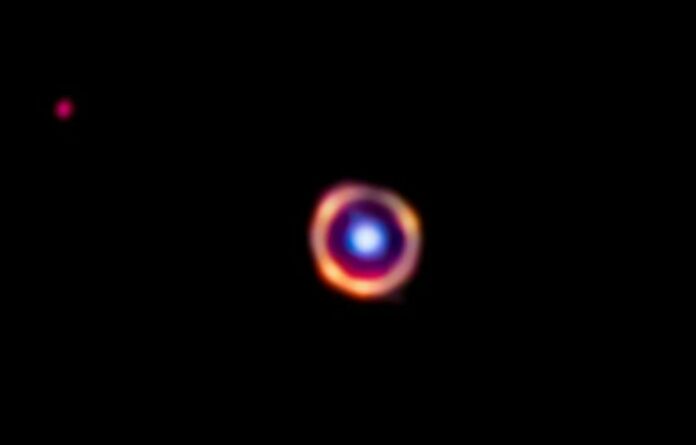NASA’s James Webb Space Telescope paves new paths in understanding the intricate interplay of chemistry and stellar birth, even during the universe’s most primal epochs.
An international team of astronomers has identified intricate organic molecules within the farthest galaxy ever observed, employing the robust capabilities of NASA’s James Webb Space Telescope.
The identification of these molecules, akin to those found in Earthly smoke, soot, and smog, underscores Webb’s potential in elucidating the sophisticated chemical processes tied to star genesis, even during the nascent eras of the universe’s existence. The new observations challenge the longstanding saying that ‘where there’s smoke, there’s fire’ at least as it pertains to galaxies.
Utilizing the Webb telescope, astronomer Justin Spilker from Texas A&M University and his team located these organic molecules in a galaxy situated over 12 billion light-years away. Given the staggering distance, the light captured by the astronomers embarked on its voyage when the universe was scarcely 1.5 billion years old, approximately 10% of its present age.
Initially discovered by the National Science Foundation’s South Pole Telescope in 2013, this galaxy has been the subject of extensive studies by numerous observatories, including ALMA’s radio telescope and the Hubble Space Telescope.
Spilker emphasized that this groundbreaking discovery, recently published in Nature, was facilitated by the combined prowess of the Webb telescope and an interesting twist of cosmic fate.
This twist refers to a phenomenon known as gravitational lensing, a concept initially put forward by Albert Einstein in his theory of relativity. Gravitational lensing occurs when two galaxies align almost perfectly from our terrestrial vantage point.
The light originating from the distant galaxy is amplified and elongated by the nearer galaxy, forming a ring-like structure known as an Einstein ring.
“By combining Webb’s amazing capabilities with a natural ‘cosmic magnifying glass,’” explains Spilker, “we were able to see even more detail than we otherwise could.
“That level of magnification is actually what made us interested in looking at this galaxy with Webb in the first place, because it really lets us see all the rich details of what makes up a galaxy in the early universe that we could never do otherwise.”
The information gathered by the Webb Telescope revealed the distinct presence of sizeable organic molecules, similar to those found in smog and smoke — the fundamental components of the carcinogenic hydrocarbon emissions on Earth that play a significant role in atmospheric pollution.
Yet, according to Spilker, these celestial smoke signs hold much less devastating consequences for their respective cosmic environments.
“These big molecules are actually pretty common in space,” Spilker adds. “Astronomers used to think they were a good sign that new stars were forming. Anywhere you saw these molecules, baby stars were also right there blazing away.”
According to Spilker, the fresh findings from Webb suggest that this notion might not entirely hold up when considering the early universe.
“Thanks to the high-definition images from Webb, we found a lot of regions with smoke but no star formation, and others with new stars forming but no smoke,” adds the researcher.
Kedar Phadke, a graduate student from the University of Illinois Urbana-Champaign who spearheaded the technical development of the team’s observations using Webb, highlighted that astronomers are leveraging the telescope to forge ties across the immense expanse of space with unparalleled capabilities.
“Discoveries like this are precisely what Webb was built to do: understand the earliest stages of the universe in new and exciting ways,” Phadke adds. “It’s amazing that we can identify molecules billions of light-years away that we’re familiar with here on Earth, even if they show up in ways we don’t like, like smog and smoke. It’s also a powerful statement about the amazing capabilities of Webb that we’ve never had before.”
This discovery marks the first time Webb has detected complex molecules in the early universe — a significant breakthrough that, in Spilker’s view, represents a starting point rather than a conclusion.
“These are early days for the Webb Telescope, so astronomers are excited to see all the new things it can do for us,” Spilker adds. “Detecting smoke in a galaxy early in the history of the universe? Webb makes this look easy. Now that we’ve shown this is possible for the first time, we’re looking forward to trying to understand whether it’s really true that where there’s smoke, there’s fire. Maybe we’ll even be able to find galaxies that are so young that complex molecules like these haven’t had time to form in the vacuum of space yet, so galaxies are all fire and no smoke. The only way to know for sure is to look at more galaxies, hopefully even further away than this one.”
Image Credit: NASA
